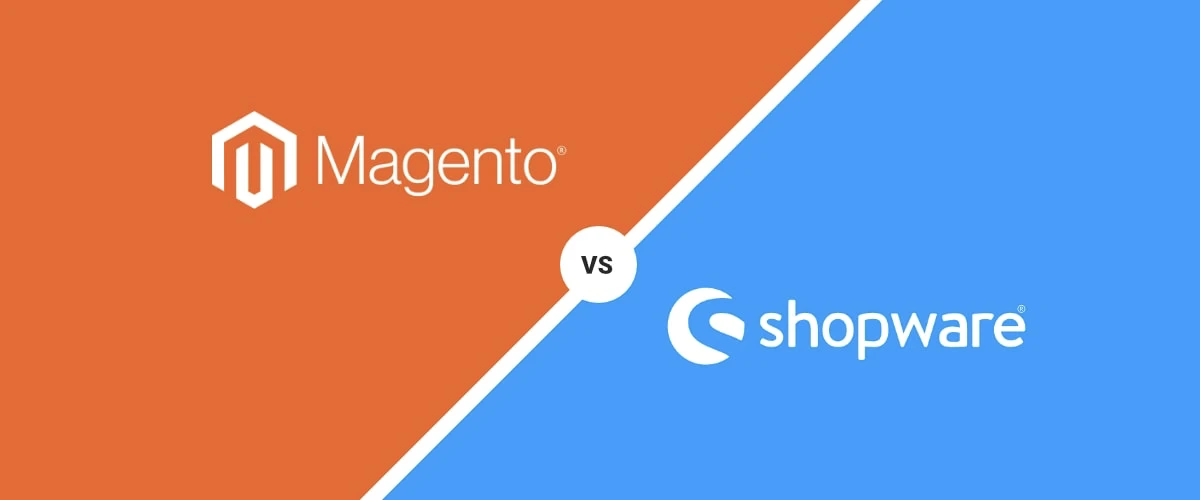
wo of the most popular webshop solutions for medium sized companies are Magento and Shopware, but what are the differences between these two systems and which one is the best? Let’s take a closer look at these systems and see what you should keep in when when choosing one of these systems.
What is Magento?
Magento is an open-source e-commerce platform that offers merchants a flexible and scalable solution for their online stores. Created by Varien Inc. and launched in 2008, Magento quickly gained traction in the e-commerce industry due to its robust set of features and high customizability.
Built on the PHP language, Magento utilizes elements from the Zend Framework and uses MySQL as its database management system. The platform stands out because of its modular architecture, which allows developers to modify and extend its core functionalities with ease. This modular approach makes Magento one of the most customizable e-commerce platforms available.
Magento offers a range of tools and features designed to help businesses sell products online. This includes capabilities for product management, order processing, customer segmentation, and advanced marketing strategies. One of Magento’s key selling points is its ability to handle multiple storefronts, languages, and currencies, making it an ideal choice for businesses with a global customer base.
Another good thing about Magento is that it boasts a vibrant community of developers, designers, and e-commerce experts. This community has contributed a plethora of extensions and themes to the Magento marketplace, further enhancing the platform’s capabilities and design options.
In 2015, Magento 2 was released, offering improved performance, a modernized codebase, and a more user-friendly admin interface. This new version addressed many of the concerns and limitations of its predecessor and solidified Magento’s position as a leading e-commerce solution.
However, with such a feature-rich platform comes complexity. Magento is often considered more challenging to set up and manage than some of its competitors, requiring a certain level of technical expertise or the hiring of specialized developers. But for businesses looking for a powerful, highly customizable solution that can scale with their growth, Magento often proves to be a top choice.
It’s also worth noting that besides the open-source version, Magento Commerce, a premium version with additional features and official support, is available for enterprises that require more advanced functionalities and dedicated assistance.
Also read – Alternatives to Magento
What is Shopware
Let’s move on to the other popular webshop system – Shopware. Shopware is a leading open-source e-commerce platform that originates from Germany. It’s designed to enable businesses to create and operate online stores with a focus on flexibility, scalability, and customization. Since its inception, Shopware has grown to become a preferred choice for a range of businesses, from small startups to large-scale enterprises.
What sets Shopware apart is its commitment to providing merchants with tools to craft unique and emotional shopping experiences. The platform emphasizes the concept of “storytelling,” allowing businesses to weave compelling narratives around their products, thereby engaging customers on a deeper level. This approach is rooted in the belief that shopping is not just a transactional experience but one that can be enriched with stories and emotions.
Shopware offers a plethora of features to support online sales, including product and order management, customer management, and a variety of marketing tools. Its API-first approach ensures that it integrates seamlessly with other systems, making it a versatile choice in a diverse tech ecosystem.
Another standout aspect of Shopware is its vast array of plugins and themes. Store owners can easily extend the platform’s core functionalities or tailor their store’s aesthetics to match their brand identity. This customization ensures that every Shopware store can be as unique as the business behind it.
While Shopware has established a significant presence in the European market, its influence and user base are expanding internationally. The combination of its powerful features, emphasis on emotional shopping experiences, and robust scalability makes it a strong contender in the world of e-commerce platforms
Also read – Benefits of Shopware
Magento vs Shopware – what should I choose?
Choosing between Magento and Shopware largely depends on your business needs, technical resources, budget, and long-term plans. Both are powerful e-commerce platforms with their respective strengths and challenges. Let’s delve into a comparison to help you make an informed decision based upon your own needs.
Origin and Popularity
Magento: Launched in 2008, it quickly became one of the leading e-commerce platforms globally, boasting a significant number of users and a vast developer community.
Shopware: Originating from Germany, Shopware has a strong foothold in the European market and has been gaining traction internationally.
Ease of Use
Magento: Known for its feature-rich platform, Magento can be complex and might require more technical expertise to harness its full potential. The admin interface can be challenging for newcomers.
Shopware: With its modern interface and emphasis on user-friendliness, Shopware can be more intuitive for merchants. Its backend is designed for clarity and ease of navigation.
Customizability
Magento: Its modular architecture offers high levels of customization. The vast Magento ecosystem has thousands of extensions and themes to add functionalities or change store designs.
Shopware: Also highly customizable, with a range of plugins available. Its “emotional shopping” features allow merchants to craft unique shopping experiences.
Performance and Scalability
Magento: Magento 2, the latest version, has improved performance over its predecessor. With the right hosting and optimization, it’s scalable for very large enterprises.
Shopware: Built to be scalable, Shopware can accommodate the growth of businesses, from startups to large-scale operations.
Price
Magento: While there’s a free open-source version (Magento Open Source), there’s also a premium version called Magento Commerce, which comes at a significant cost but offers advanced features and support.
Shopware: Offers both free and paid versions. The premium versions have additional features and official support. Like Magento, additional costs might arise from extensions, themes, and hosting.
Support
Magento: Has a massive global community of developers, ensuring a wide range of third-party tools, extensions, and resources. Magento Commerce offers official support.
Shopware: While its community is smaller than Magento’s, it’s very active, especially in Europe. Premium versions provide official support.
Target Audience
Magento: Suitable for businesses of all sizes but often favored by medium to large enterprises or those with specific and complex requirements.
Shopware: While it caters to all business sizes, its storytelling and emotional shopping features might appeal more to brands that emphasize customer engagement and unique shopping experiences.
What to choose
Choose Magento if you have the technical resources to handle its complexity, require a globally recognized platform, or have very intricate e-commerce needs that can leverage its vast ecosystem.
Choose Shopware if you prioritize user-friendliness, want to focus on creating unique shopping experiences, or are based in Europe where its community is strongest.
As with any major decision, it might be beneficial to test both platforms or consult with experts in each to determine which aligns best with your specific requirements. Both are great systems, but there are still enough differences to make one better than the other for your company. In most cases for smaller and midsized companies I would recommend Shopware though.





